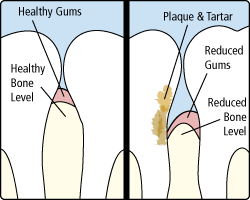Gum Disease

Gum disease is an inflammation of the gum line that can progress to affect the bone that surrounds and supports your teeth. Though you can have gum disease and not know it, the most common symptoms are:
- Gums that bleed easily
- Red, swollen, tender gums
- Gums that have pulled away from the teeth
- Persistent bad breath or unpleasant taste in the mouth
- Pus between your teeth and gums
- Loose or separating permanent teeth
- Any change in the way your teeth fit together when you bite
- Any change in the fit of partial dentures
Types of Gum Disease
There are three stages of gum disease: gingivitis, periodontitis, and advanced periodontitis.
- Gingivitis: Gingivitis is a treatable and reversible form of gum disease. It is the first and mildest stage.
- Periodontitis: Periodontitis is caused by bacteria that attach to the teeth at the gum line and result in an infection. Your body tries to fight the infection. Some of the substances that your body produces can be harmful. They damage the jawbone and the ligament around the teeth.
- Advanced Periodontitis: If this process continues, the teeth become loose. Pockets form between the teeth and gums. These pockets are places where more bacteria grow. If your periodontitis is not treated, your teeth can become loose and even fall out.
Causes of Gum Disease
Gum disease occurs when plaque that is constantly forming on your teeth accumulates and hardens over time. The bacteria found in this buildup causes damage to the gum tissue.
Poor oral hygiene, such as infrequent brushing and flossing, along with irregular visits to our Fairhope, AL dental office, are the most common causes of gingivitis. According to the American Academy of Periodontology, factors such as smoking or chewing tobacco, stress, inadequate nutrition, pregnancy, diabetes, puberty, substance abuse, autoimmune diseases, and certain medications contribute to increased risk for developing gum disease.
Preventing Gum Disease
The most important step is to visit Deese Dentistry on a regular basis. A thorough professional cleaning and checkup followed by good home care are usually enough to reverse gingivitis. For adequate home care, the American Dental Association recommends that you brush your teeth twice per day with an antimicrobial toothpaste and use an interdental aid such as floss at least daily.
Do not forget to brush your tongue! Your mouth should be at its cleanest right before going to bed. There is no disruption to the growing bacteria in your mouth while sleeping; therefore, this is the time that bacteria can do the most damage.
